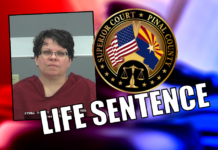The Arizona Supreme Court ruled 4-3 today that Pinal County’s transportation excise tax designed to fund projects in the county is invalid, jeopardizing tens of millions of dollars already collected.
The ruling dealt with Proposition 416, the county’s plan for improving Pinal County transportation infrastructure, and Proposition 417, which put in place the taxing mechanism to fund improvements. Both propositions were passed by voters in a November 2017 special election.
Prop 417 created a two-tiered, one-half percent sales tax on the first $10,000 of any transaction and a zero percent sales tax on any portion over $10,000.
About $80 million collected under Prop 417 has been sitting in escrow awaiting the high court’s decision on the case brought by plaintiffs Harold Vangilder, Dan Neidig and the Arizona Restaurant Association and argued by the lawyers from The Goldwater Institute, a Phoenix-based public policy research and litigation organization dedicated to “empowering all Americans to live freer, happier lives.”
The transportation excise tax was the linchpin for funding projects crucial to Maricopa including the widening and improvement of State Route 347 and the Sonoran Desert Parkway – two primary projects designed to improve ingress and egress from the city.
The ruling could effectively cut off a significant source of funding for those traffic improvements.
Maricopa Vice Mayor Vincent Manfredi lamented the court’s decision.
“It has been a long and arduous journey to get the funding we need to repair and expand the road systems in Pinal County, and this is just another hurdle in our way,” Manfredi said. “The City of Maricopa will continue to work to get the funding needed to upgrade and repair the roads leading in and out of the city. I am doubly committed to working with every organization to find alternate solutions to a mess that needs to be fixed.”
City and county attorneys and officials are reviewing the decision to determine its impact and were unavailable for comment Tuesday.
A trial court had invalidated the tax, but the state Court of Appeals later upheld the tax structure as valid.
On Tuesday the majority of the state Supreme Court concluded that Pinal County complied with state law in adopting the transportation excise tax. But they ruled the two-tiered structure was not permitted by state law.
In a partial dissent, the minority justices wrote that the legislature “has expressly and unambiguously granted Pinal County precisely the authority it relied upon to levy the tax and to set an excise tax rate on retail sales, and the county did not violate a single express statutory condition on the exercise of the delegated authority.”
“Because the Pinal County Regional Transportation Authority and the Pinal County Board of Supervisors properly authorized and presented a regional transportation plan and a transportation excise tax, which Pinal County voters approved, all pursuant to a valid exercise of authority delegated by the legislature, we conclude that the retail excise tax is a valid tax with a variable rate.”
The City of Maricopa had joined three other Pinal County municipalities in filing an amicus brief seeking prospective relief if the transportation excise tax was ruled invalid. That means the ruling would have would have applied to future collection of the tax but not negate the collection of taxes before the ruling. That request was denied by the high court.
In a news release Tuesday posted on the Goldwater Institute’s website, vice president for litigation Timothy Sandefur said his organization believes the next step is for retailers to get back the money they paid to the county via collection of the tax.
“After the final judgment is issued in the case, Arizona retailers should be entitled to refund the taxes they were illegally forced to pay,” Sandefur wrote. “Business owners should consult their attorneys and accountants for information on how that process works.”
It was unclear how the retailers, who collected the funds from consumers, would return the tax proceeds.
Read the Arizona Supreme Court decision here: Supreme Court Opinion
“The Arizona Supreme Court has rightly put an end to Pinal County’s illegal tax, and we look forward to the public getting back the money they’ve been unlawfully forced to hand over for years,” Sandefur wrote.
“There’s no doubt Pinal County needs to repair its infrastructure – but the county has repeatedly wasted public money instead of doing that, and then come back to demand more from taxpayers,” he added. “This time, it did so through an illegal tax. Then, it refused to easily redesign the tax to comply with the law, instead wasting years and even more taxpayer money. It’s time public officials respected the law and followed the legal process, and we’re glad the justices insisted on that.”


![3 things to know about the new city budget Vice Mayor Amber Liermann and Councilmember Eric Goettl review parts of the city's 2024 operational budget with Mayor Nancy Smith on April 24, 2024. [Monica D. Spencer]](https://www.inmaricopa.com/wp-content/uploads/2024/04/spencer-042424-preliminary-budget-meeting-web-218x150.jpg)






![MHS G.O.A.T. a ‘rookie sleeper’ in NFL draft Arizona Wildcats wide receiver Jacob Cowing speaks to the press after a practice Aug. 11, 2023. [Bryan Mordt]](https://www.inmaricopa.com/wp-content/uploads/2024/04/cowing-overlay-3-218x150.png)


![Alleged car thief released without charges Phoenix police stop a stolen vehicle on April 20, 2024. [Facebook]](https://www.inmaricopa.com/wp-content/uploads/2024/04/IMG_5040-218x150.jpg)


![3 things to know about the new city budget Vice Mayor Amber Liermann and Councilmember Eric Goettl review parts of the city's 2024 operational budget with Mayor Nancy Smith on April 24, 2024. [Monica D. Spencer]](https://www.inmaricopa.com/wp-content/uploads/2024/04/spencer-042424-preliminary-budget-meeting-web-100x70.jpg)

